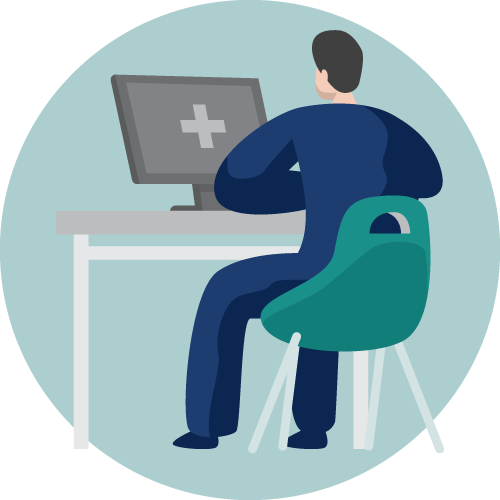Medical Office Manager Training
Learn the skills you need to become a Medical Office Manager.
Medical Office Manager Training
Learn the skills you need to become a Medical Office Manager.
Medical Office Manager Training
Our Medical Office Manager program is online by design so you can study at your own pace, wherever and whenever works for you.
-
8 Months of Full Access
-
$55,704 Average Salary*
-

CMAA, CEHRS, and CBCS Certification Prep
6 Reasons to Complete Your Medical Office Manager Training With CareerStep
Study on your schedule.
24/7 Web access means you can learn whenever and wherever you want—fitting study time in and around your other commitments.
Ask for help anytime.
Your training is online, but you’re never alone. Real people support you every step of the way via phone, live chat, and email.
Get certified.
Our career training provides the knowledge and certification prep materials you need to sit for the CMAA, CEHRS, and CBCS certification exams.
Learn at your own pace.
With 8 months of program access, you can study wherever and whenever you'd like.
Get in on a growing industry.
The healthcare field is expected to add 1.8 million new jobs through 2032 to accommodate the U.S.’s aging population.**
Earning potential.
The average medical office manager salary is between $43,000 to $83,000 per year.*
1. Start today.
Begin your training (and transformation) right now.
2. Learn your way.
Complete your training on your own terms.
3. Get certification-ready.
Prepare to take valuable certification exams.
Ready to Dive In?
Sign up online now to start the Medical Office Manager program.
"*" indicates required fields
Program Details
Our Medical Office Management program was built to give you the confidence and ability needed to impress potential employers and land your next office management gig.
- > 8 Months Full Access
- > Self-Paced Study
- > Anywhere, Anytime Learning
- > 1:1 (Human) Support

What You’ll Learn
Our medical office manager training online is the quickest way to reset your career and retool yourself with valuable new skills. Bonus: You’ll get the info you need to pass the CMAA, CEHRS, and CBCS exams.

Computer Skills
Become more proficient with the apps and business tools of Microsoft Office, the productivity platform that most medical offices run on.

Office Management
Learn standard medical office procedures, finances, healthcare documentation, medical terminology, and effective communication skills.

Healthcare Regulations
Understand the Health Insurance Portability and Accountability Act (HIPAA): compliance and protecting patients’ health information and privacy.

Medical Billing
Get to know reimbursement methods, the landscape of payers and payment systems, the basics of billing, and industry-standard software tools.
Medical Office Manager Program FAQs
How much does a medical office manager make?
The average yearly salary for a medical office manager is around $55,704.* However, salary can vary based on your experience, credentials, education, employer, and even the state you work in.
How do I become a medical office manager?
To become a medical office manager, you’ll generally need to have relevant education, credentials, and job experience. However, the steps you need to take to get the job can vary depending on where you want to work.
In smaller medical practices, you may only need some relevant job experience to get the role and can learn the rest through on-the-job training. Many larger practices may often require formal education, certification, and clearly demonstrated skills such as knowledge of healthcare systems, project management skills, and leadership skills.
What does a medical office manager do?
A medical office manager is responsible for the day-to-day administrative operation of a doctor’s office or medical practice. Typical tasks include
- Overseeing financial operations, such as billing patients.
- Supervision of administrative staff.
- Setting the work schedule and approving time off requests.
- Collaborating with doctors and healthcare staff to ensure a well-run office.
- Making sure all necessary regulations and guidelines are followed.
- Overseeing office inventory and ensuring all necessary supplies are fully stocked.
- Working with staff to ensure a high quality of customer service and patient care.
How to become a certified medical office manager
To become a certified medical office manager, you’ll generally need to complete some formal education and then sit for, and pass, a certification exam. Typical certifications you can earn include:
- Certified Medical Administrative Assistant (CMAA)
- Certified Electronic Health Records Specialist (CEHRS)
- Certified Billing and Coding Specialist (CBCS)
Get Trained Today.
This program includes comprehensive training, career support, and coaching, along with certification prep materials and exam fees.
$4,199 for full program access
$3,899.00 for eligible MyCAA and ACA learners
Save 15% OFF the price above when you pay in full today!
Or call now: 800-411-7073 >>
Tight Budget? You’ve Got Options.
Make Small, Easy Payments
We’re flexible and totally committed to working with you to find affordable down and monthly payments.

MyCAA Funding
The My Career Advancement Account (MyCAA) program offers funding for this program for eligible military spouses. This funding can cover a portion of the cost of approved CareerStep courses.
*PayScale. “Average Office Manager, Medical Office Yearly Pay” Payscale.com. Accessed March 27, 2024.
Statements found on PayScale are not a guarantee of any post-graduation salary, in part because the data used to estimate salaries includes workers from differing educational backgrounds, levels of experience, and geographic areas of the country.
**Bureau of Labor Statistics, U.S. Department of Labor. “Healthcare Occupations.” Occupational Outlook Handbook. Accessed March 27, 2024.
Statements found in the United States Department of Labor Occupational Outlook Handbook are not a guarantee of any post-graduation salary, in part because the data used to create the Occupational Outlook Handbook includes workers from differing educational backgrounds, levels of experience, and geographic areas of the country.


